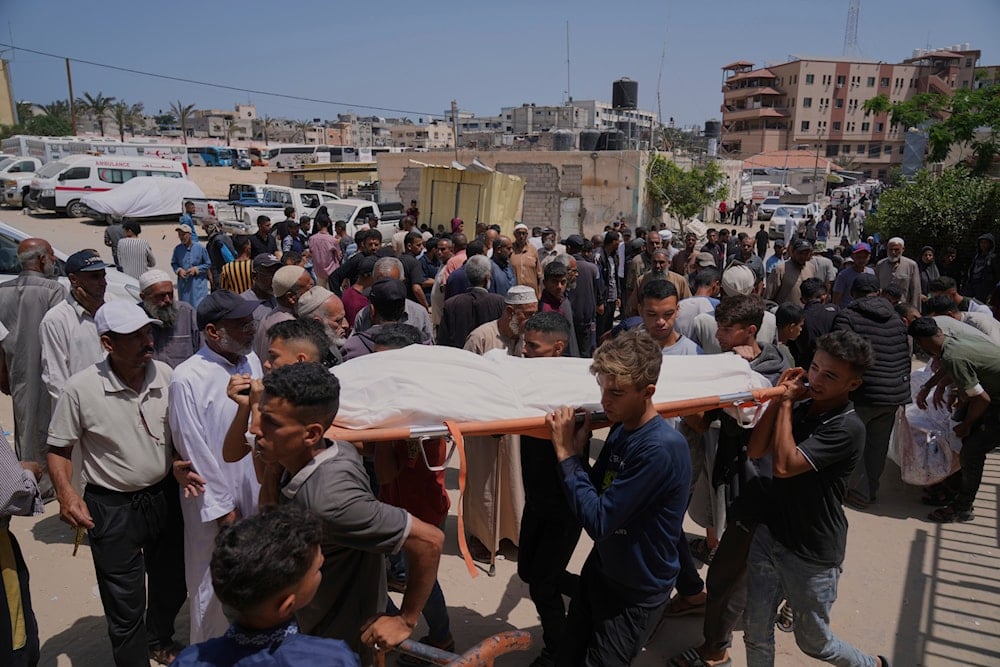Latin America escalates diplomatic break with 'Israel' over Gaza
Amid the Gaza war, several Latin American countries have severed ties or taken diplomatic action against "Israel," with Chile, Bolivia, and Colombia among the most vocal.
-

Palestinians carry the body of a person who was killed while heading to a Gaza aid hub, during a funeral at the Nasser Hospital in Khan Younis, southern Gaza Strip, on June 1, 2025. (AP Photo/Abdel Kareem Hana)
As "Israel" faces mounting global criticism over its ongoing war on the Gaza Strip, Latin America has emerged as a region of intensifying diplomatic confrontation.
According to Israeli media, seven Latin American countries have taken official action against "Israel," with three severing ties completely.
Chile imposes arms and trade ban
This week, Chilean President Gabriel Boric announced a ban on arms sales and trade with companies operating beyond the Green Line, accusing "Israel" of committing ethnic cleansing. In return, the country's stance triggered a sharp deterioration in relations between Chile and "Israel".
Santiago previously recalled its ambassador, withdrew military attachés, and supported the genocide case against "Israel" at the International Court of Justice in The Hague.
Additionally, Israeli Channel 12 reported that "Israel" fears Chile may take the final step of fully severing diplomatic relations.
Brazil likens Gaza war to Nazi crimes
In early 2024, Brazilian President Luiz Inácio Lula da Silva caused a major diplomatic row by comparing "Israel's" actions in Gaza to those of Adolf Hitler, describing the offensive as a “genocide.”
Following the remarks, then-Foreign Minister Israel Katz declared the Brazilian president "persona non grata." Brazil responded by recalling its ambassador from "Israel" for consultations and did not return him.
Bolivia cuts ties and joins genocide lawsuit
Bolivia officially severed diplomatic ties with "Israel" shortly after the outbreak of the war and joined the Gaza genocide lawsuit filed by South Africa before the ICJ.
The country had previously broken ties with "Israel" in 2009, later restoring them in 2020. And the current government is among the most vocal Latin American supporters of Palestine.
Amid the Israeli siege on Gaza, Bolivia's Foreign Minister Celinda Sosa Lunda strongly condemned, on May 10, the Israeli blockade of the Gaza Strip, expressing dismay as the 90-ton humanitarian aid shipment from Bolivia remains stalled at the Rafah border.
The Bolivian government urged Israeli authorities to permit the aid's passage, emphasizing the critical need for its delivery.
Colombia ends relations, bans coal exports
Additionally, Colombian President Gustavo Petro announced in May 2024 a complete break in relations with "Israel," stating, “We do not support genocide.”
Bogotá later imposed a coal export ban targeting "Israel," a significant move given that Colombia is a major supplier. On that note, Colombia had earlier recalled its ambassador in protest.
Calls for legal action against 'Israel'
Mexico has formally joined the case against "Israel" at the International Criminal Court, calling for an immediate ceasefire in Gaza.
In October 2024, Nicaragua severed ties with "Israel", condemning its actions as "fascist" and accusing it of perpetrating genocide.
Additionally, the Honduran Ministry of Foreign Affairs also recalled its ambassador to "Israel" for consultations in protest of what it called violations of international humanitarian law in Gaza.
Remaining allies maintain ties with 'Israel'
Despite the regional backlash, Channel 12 noted that five Latin American countries continue to maintain close relations with "Israel."
Argentina leads this group, with President Javier Milei expected to visit soon to launch a direct air route and sign new cooperation agreements.
Paraguay, Panama, Ecuador, and Guatemala have also preserved or expanded ties with "Israel" amid the war.
As the Gaza genocide lawsuit progresses and civilian casualties mount, Latin America’s diplomatic break with "Israel" reflects growing international scrutiny and a sharp regional divide in policy responses to the war on Gaza.

 4 Min Read
4 Min Read










